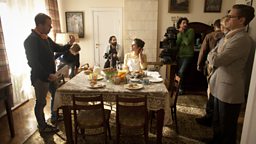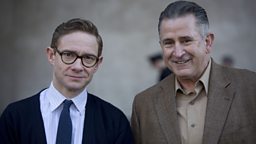The making of The Eichmann Show
The filming of The Eichmann Show took place in Vilnus, Lithuania. The production team had to consider the story of the Eichmann trial, and the historical truths it unveiled, with great sensitivity and objectivity. Here, the drama's Producer Laurence Bowen, Director Paul Andrew Williams and Writer Simon Block talk about their experiences making The Eichmann Show and what was so compelling about this story from history.

Laurence Bowen, Producer
Laurence Bowen has worked on a host of productions, including The Hello Girls, Stone Scissors Paper and Dual Balls. He won a BAFTA for My Life as a Popat and a BAFTA nomination for Suburban Shootout, in addition to RTS, Broadcast and Chicago Film Festial awards. As well as serving as the Producer for The Eichmann Show, Bowen also executive produced the BAFTA award winning Lizard Girl. Here, Laurence reveals more about the captivating story behind The Eichmann Show and why he felt compelled to retell the story for new audiences.
Israel’s decision to call 111 witnesses, who between them would tell the world of the Holocaust, was very compelling from a storytelling perspectiveLaurence Bowen
The Eichmann Show is about the televising of the Eichmann trial in 1961 – the behind-the-scenes story of the producer and director who overcame many obstacles to film the trial. Every day, footage from the trial was sent to 37 countries where the material was shown the next day. It became the world’s first ever documentary series, and in the process changed the way people saw the Second World War. It was the first time many people had ever heard the story of the Holocaust from the mouths of the victims. So it had a huge impact historically, but it also was a huge event in terms of television.
When people think about the Eichmann trial, they don’t really think about the cameras or the filming. I was doing some research into the trial when I saw one tiny little thread mentioning the producer, Milton Fruchtman. I started googling away and was interested to discover the first trial ever to be televised and, with four cameras filming, treated like a drama with close ups and zooming shots. I became even more intrigued when I discovered Milton had hired Leo Hurwitz. He was a director who had been blacklisted by Senator McCarthy for ten years for his left wing beliefs in America.
The working relationship between Milton Fruchtman and Leo Hurwitz must have been very interesting. To consider the obstacles they faced in Jerusalem: being told by the judges a week before the trial was due to start that cameras were not permitted in the courtroom and then in the last few days to come up with this solution of hiding the cameras in the walls – that’s a really interesting story.
Retelling the story brings about an opportunity for a new audience to learn about the Eichmann trial. Israel’s decision to call 111 witnesses, who between them would tell the world of the Holocaust, was very compelling from a storytelling perspective. It’s an invaluable opportunity to introduce to audiences how it may have felt for audiences in 1961 to listen to first-hand accounts of what happened to them at Auschwitz.

Paul Andrew Williams, Director
Paul Andrew Williams is both a director and writer, best known for his work on London to Brighton (2008), The Cottage (2008), Unfinished Song (2012) and Murdered By My Boyfriend (2014). Here, Paul describes why the story caught his attention and the importance of archive footage in the drama.
We’ve got a chance, through drama, to bring this subject back to people’s attentionPaul Andrew Williams
I received the script the day before I went on holiday and immediately knew I wanted to be involved. It’s a subject I was really interested in anyway and it was great to be asked. I thought the two central characters were really interesting - they had conflicting opinions on certain things, but both wanted to bring this story to the world.
It was always our choice to use mixed media and incorporate the archive footage alongside the drama. It brings a sense of us being there and will hopefully reawaken interest in the subject for those who have already heard about the Eichmann trial and those who know nothing about it. We’ve got a chance through drama to bring it back to people’s attention. As well as archive from the trial, we also use other footage of the day and news footage just to give everyone a really good sense of where we are and what timeframe we’re in.
The cast came together in a brilliant way. When I met Martin it was clear he would bring so much to it, and Anthony’s interest in the subject and his style of acting is right up my street. They were an absolute dream to work with, very professional, and I’d hope to work with both of them again in the future.

Simon Block, Writer
Simon Block is a writer with expansive experience in television, having worked on a host of series including, Every Silver Lining (1993), Life After Birth (1996), Inspector Lewis (2012-2013) and the BAFTA Award winning The Shooting of Thomas Hurndall (2008). Simon reveals how he researched Milton Fruchtman and Leo Hurwitz in order to reflect their real-life characters through speech.
You can get a sense of the person from clips of Leo being interviewed and from talking to his son and people he worked withSimon Block
It is a completely different and fascinating way of telling the story of this event. I’d read about the trial years ago, but all I knew was that the trial had been filmed. I had no idea it had been filmed by a television company and I had no idea how often it was filmed. I didn’t know any of the protagonists at all, what they went through to get the job, what they went through to keep it all going day after day, the artistic decisions they had to make.
We brought together lots of different sources from research to create the drama. There are a few documentaries about Adolf Eichmann, the trial and how he was kidnapped in Buenos Aires, so we watched all those. I spoke to Milton Fruchtman who lives in America. And then we decided to focus in on the director, Leo Hurwitz, because it was his vision which created the aesthetics of the filming and he turned out to be a fascinating character in his own right. We located where his archive is kept in New York State and met with his son.
When scripting real life characters, it's important to build an accurate picture of what they’re really like. You can get a sense of the person from clips of Leo being interviewed and from talking to his son and people he worked with. There are loads of letters in his archive to his wife and son about the trial, and about all sorts of other issues from domestic to professional that gradually you piece together. With Milton, we were able to speak to him, so could get a very strong sense of him that way. You could see what he had to go through to get the job and the foresight.

